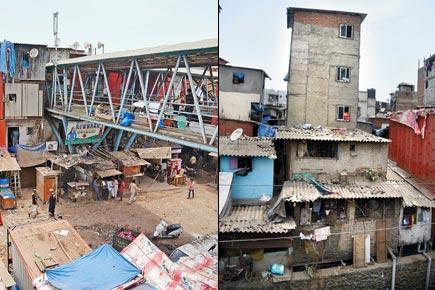Despite 2009's devastating blaze when the fire brigade struggled to access its pinched alleys, Behrampada spits in the face of BMC rules, breaking its own record to build multi-storeyed huts that tower at 80 feet

Like a giant constrictor tightening its coils around its prey, the towering slums of Behrampada, spread over 7 acres of land, are menacingly closing in on the Bandra skywalk.
ADVERTISEMENT

The skywalk connects the Bandra station to Bandra-Kurla Complex as well as the railway terminus in the east.
On December 13, 2009, mid-day had reported how five-storeyed slums, over 60 ft high, had mushroomed in the area without architectural blueprints or foundations. We had warned that disaster would come knocking again — a fire that broke out in the slums in June that year raged on for over 40 hours, claimed five lives and displaced 4,000 people. The biggest challenge that the fire brigade faced while dousing the blaze was getting through the tightly squeezed bylanes of the settlements.

A 10x10 ft room draws a rent of Rs 15,000. Adding floors is a common method to earn a quick buck. Pics/Suresh Karkera
Although a single window system for all clearance from various government agencies has been put in place to undertake a legal construction in Mumbai, the process could take over a year. It is evident that this hasn’t deterred the illegal slums of Behrampada.

At several points, the shanties are as high as the skywalk
No sight of action
After the mid-day report, the authorities had promised to crack down on these settlements, but a reality check over six years later throws up a far more daunting picture: the shanties have continued to grow vertically, each sandwiched between the others. Some of the huts have been raised to six storeys, which could easily be 80 ft high, and almost kiss the skywalk. Their total population exceeds 1 lakh.

The slums, packed close to each other, bear down on the Bandra skywalk and the railway tracks. A number of them have been rented out for commercial use
Last December, the BMC had cleared a proposal — dubbed by its critics as an appeasement policy — made by corporators across party lines to allow the height of post-1995 shanties to be increased from 14 ft to 18 ft, allowing them to ground-plus-one structures. The Behrampada slums have beaten even this relaxed restriction by a mile.
Ticking time bomb
The shanties are built so close to each other that if one were to cave in, say, during a spell of heavy rain, it would set off a domino effect. An outbreak of a fire could gut acres of the settlement.
Residents say hundreds of slumdwellers added floors to their existing ground-plus-two structures only a few months ago.
“Initially, adding one or two storeys and then giving them out on rent was a quick way for many to make an extra buck. As the greed grew, so did the height of the structures,” alleges a resident.
A small 10x10-sq ft structure, which is usually taken for commercial use, can fetch anywhere between Rs 15,000 and Rs20,000 a month.
The resident says most of the floors have been added under the guise of carrying out repairs. She claims that such work was once carried out covertly, covered by tarpaulin and canvas sheets. Today, it’s all allegedly done in the open, without the slightest fear of the law.
 Subscribe today by clicking the link and stay updated with the latest news!" Click here!
Subscribe today by clicking the link and stay updated with the latest news!" Click here!






